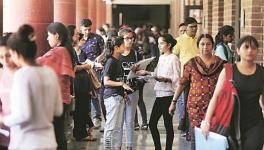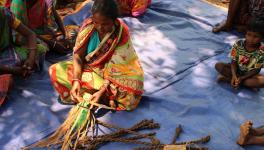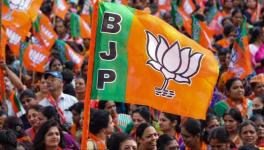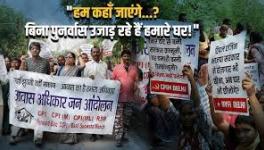Ice Cream to Kole Wetlands: How a Kerala Panchayat is Tackling Poverty With Planning, Participation
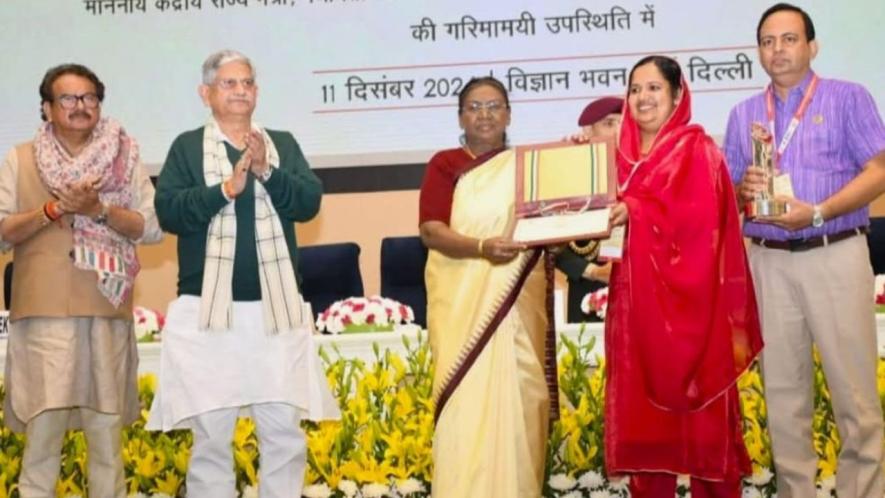
Bineesha Mustafa, president of Perumbadappa gram panchayat, receiving the award from President Droupadi Murmu (Photo sourced by Navya PK)
Malappuram, Kerala: Two decades after she quit her job as a primary school teacher to take care of her children, Fathima VV (48) stepped out of her home to work again. This time, not in a classroom, but as the head of a small ice cream manufacturing unit in Kerala’s Malappuram district. With a grant from the Perumpadappa Panchayat, Fathima’s business, Blueberry, has grown to employ four people and supplies ice cream to shops across the district. A former panchayat ward member herself, she hopes to grow her distribution statewide soon.
In 2022-23, the year in which this coastal panchayat won the second prize in the ‘poverty-free and enhanced livelihoods’ category of the Deen Dayal Upadhyay Panchayat Satat Vikas Puraskar or the National Panchayat Awards, Fathima's was one of three women-led enterprises which received Rs 5 lakhs cumulatively to invest in their business; one of the other grantees, an SHG, expanded their paper bag unit.
“After Covid, our focus was on livelihoods and poverty alleviation since many people had lost their jobs during the pandemic,” Bineesha Mustafa, president of the Perumpadappa panchayat, said. “Some homemakers were interested in working outside the home, so we helped them start businesses as well."
Since then, 24 Gulf-returnees have also been identified to receive Rs 31 lakhs in total under the state government’s Kudumbashree Mission to start new businesses; some of them now rent out boats for tourism.
Fathima’s immediate goal is to buy a generator for her factory and about 25 freezers that she can supply to shops to store Bluberry's products. Stocking her merchandise in existing freezers in shops is affecting her profits. These new purchases would cost her Rs 10 lakh, and she plans to apply for a subsidy from the panchayat again this year to cover part of the costs.
According to Sunil M, Vice Chairman of the panchayat’s Planning Board, “Panchayats can provide subsidies of up to 40% for women-led self-employment ventures,” like Fatima’s ice cream factory, which she now manages herself after the exit of her two male business partners. “We got Rs 3 lakh subsidy from the panchayat, and another Rs 1 lakh loan from the bank. This has covered 10% of our cost so far,” she says. The subsidy is structured so that entrepreneurs receive it only when they repay their bank loans, ensuring “the panchayat’s money doesn’t get wasted in loss-making ventures”, according to Village Extension Officer, Roopesh C.
During the award-winning year, the panchayat spent Rs 2.7 crore out of its 4 crore annual budget on poverty alleviation, focusing on livelihoods. It is for this effort that Mustafa received the award from President Droupadi Murmu in New Delhi in December 2024.
Sunil explained that the panchayat’s recognitions are not due to one single project, but rather the consistent and efficient implementation of different schemes and said “any panchayat can do this”. “Only if local officials of all the departments cooperate,” he added, saying, “In Perumpadappa, we have a good team of administration officers to implement whatever initiatives we decide, and it is our biggest advantage.”
Groundwork for growth
At Perumpadappa panchayat – home to approximately 33,000 people, spread across nearly 7,600 households – poverty alleviation is not just about helping people make money, it’s about helping them save, reclaim and rebuild.
The panchayat’s main initiatives that year, apart from funding women entrepreneurs, included subsidising farming and livestock management, housing subsidies for landed Schedule Caste families, and healthcare, including ensuring access to medicines for the chronically ill in need.
Perumbadappu’s achievements are a result of the long, hard work that went into their five-year plan that began in 2019, which prioritised housing, drinking water and farming. Of the 420 homes that were identified for the housing subsidy due to their dilapidated conditions, 300 have already benefited. Drinking water has been supplied to all households through the Jal Jeevan Mission, says Sunil. And farming and livestock remain the panchayat’s main ‘productive’ sectors.
The Kerala government hasn’t given instructions for a fresh five-year plan in 2024, but Perumpadappa has continued to prepare its annual Gram Panchayat Development Plan in the spirit that it is intended, with stakeholder inputs and a current survey.
Each year, four standing committees — made up of ward members — draft the budget according to the government norms. The draft is reviewed by the panchayat’s planning committee, which includes implementing officers from line departments, i.e the administration.
Once this internal review is done, the draft budget is taken to the people through the gram sabhas.
In Kerala, gram sabhas are held at the ward level due to high population density. Participation in gram sabhas can vary. “Some wards have more participants than required, whereas in a few wards we have had to reschedule gram sabhas because of low turnout (If the quorum of 10% of voters isn’t met),” said Sajan C Jacob, Secretary, Perumpadappa Panchayat.
To ensure consensus, two representatives from each ward are chosen to attend the annual development seminar, where the budget is finalised.
Currently, one major roadblock in effective planning is the panchayat's lack of updated digital records of local administrative data. "Sometimes the data is not clear, and only during implementation do we realise that the project isn’t feasible and has to be revised," says Sunil.
To fix the gap, this year the panchayat has allocated Rs 12 lakh to hire an external agency to do a comprehensive survey. “The idea is to have all of the panchayat’s data available online, including taxation data. We will also give an Annual Maintenance Contract to the agency for five years to update the data,” says Sunil. He believes this will help the panchayat plan schemes better, raise more revenue, and provide services to more people.
Farm to pharmacy
In 2022-23 alone, according to a press note from the panchayat, they spent Rs 70 lakh on healthcare, including medicine supply for patients below the poverty line (especially kidney patients) and covering the salaries of one additional shift doctor and pharmacist at the PHC and a palliative nurse at the panchayat's palliative care unit.
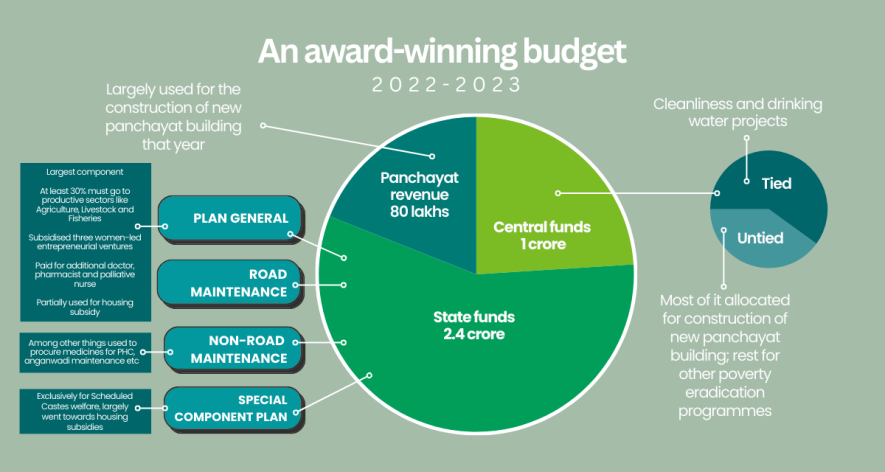
A pie chart showing the budget funds of the panchayat .
What stands out is a creative balancing of funds from the centre, state and the panchayat’s revenues to meet the state’s mandates as well as community needs.
“In 2022-23, we used mainly state grants, and a small part of the central grants, for the poverty eradication programmes,” says Sunil, with the Centre’s tied funds going to cleanliness and drinking water, and untied funds going towards construction of the new panchayat building, in line with their theme for the year which was infrastructure development. This project also used most of the panchayat’s own revenue that year, which comes mainly through taxes.
The year the panchayat was able to subsidise housing for 40 families, with Rs 4 lakh given to each family under funds from the three-tier panchayat system, the state government and HUDCO loans. Since the beneficiaries were fewer in number, the panchayat was even able to reduce the loan burden by tapping into the state's Plan General funds, in addition to the Special Component Plan funds, meant specifically for the welfare of Scheduled Castes.
On the 300 hectares of Kole wetlands that come under the panchayat, farmers are being assisted to continue the traditional practice of below-sea-level paddy farming. This Ramsar site is a unique ecosystem which acts as a natural reservoir during the monsoon, storing excess rainwater and helping prevent floods. In the dry season, when water levels recede, the land is used for cultivation.
“Generally, paddy farming is not so profitable, and in the absence of government support, farmers may stop doing it,” Sunil said. To encourage cultivation, the panchayat purchases seeds and fertilisers and supplies them free of cost through Krishi Bhavans. It also provides individual subsidies to partially offset labour costs, he added. In the livestock sector, subsidies were granted for buying livestock, providing treatment and vaccinations, supplying nutritious feed, and assisting dairy farmers.
Additionally, to expand cultivation under paddy as envisioned under the panchayat’s five-year plan, proposals have been submitted to the Kerala Land Development Corporation Ltd (KLDC) to convert barren private land into cultivable plots. The KLDC undertakes infrastructure works like bund construction and electrification using state funds.
According to Sunil, most barren land in the panchayat is now cultivable. They are usually taken on lease by entities like Kudumbashree, who farm there with MGNREGS workers.
Sunil adds, “Even during fund shortages, we ensure that the budget for productive sectors is protected. We instead reduce spending on areas like road works. That’s because the productive and welfare sectors affect people’s lives the most."
(Navya PK is a freelance journalist and a member of 101Reporters, a pan-India network of grassroots reporters.)
Get the latest reports & analysis with people's perspective on Protests, movements & deep analytical videos, discussions of the current affairs in your Telegram app. Subscribe to NewsClick's Telegram channel & get Real-Time updates on stories, as they get published on our website.












